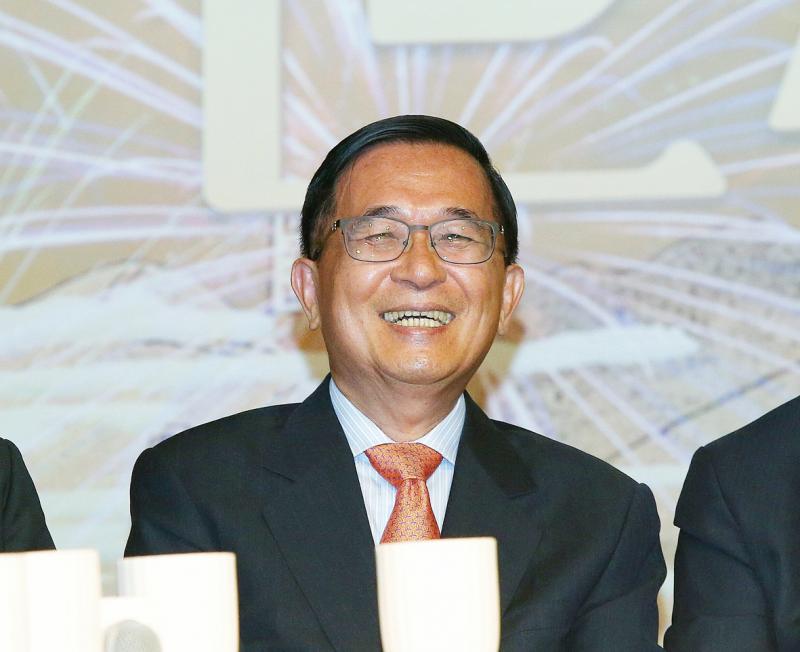Taichung Prison authorities on Monday said that they have not received an application from former president Chen Shui-bian (陳水扁) to host a radio show next year, amid speculation that doing so would contravene his medical parole.
While serving a 20-year sentence for money laundering and bribery, Chen was released from the prison on medical parole on Jan. 6, 2015, because of his deteriorating health.
Among the conditions of his parole is the requirement that he apply for approval from Taichung Prison to undertake any public activity other than seeking medical attention. Hosting a radio show would seem to fall under that category.

Photo: CNA
Chen, who was president from 2000 to 2008, announced earlier on Monday that he would be hosting a one-hour show for Kaohsiung-based Smile Radio (微微笑廣播網) every Sunday starting on Sunday.
Chen wrote on Facebook that he would use the show to interview those who have inspiring life stories to share with the public.
Chen’s son, Chen Chih-chung (陳致中), said that his father would not comment on politics during the show, and that his father had notified the Ministry of Justice, which is in charge of Taichung Prison, of his plans.
The ministry did not confirm that it had received the notification.
When Chen Shui-bian’s medical parole was granted, he was prohibited from making stage appearances or public speeches, expressing political views or giving interviews to the media, or else have his parole revoked.

Chinese Nationalist Party (KMT) Chairman Eric Chu (朱立倫), spokeswoman Yang Chih-yu (楊智伃) and Legislator Hsieh Lung-chieh (謝龍介) would be summoned by police for questioning for leading an illegal assembly on Thursday evening last week, Minister of the Interior Liu Shyh-fang (劉世芳) said today. The three KMT officials led an assembly outside the Taipei City Prosecutors’ Office, a restricted area where public assembly is not allowed, protesting the questioning of several KMT staff and searches of KMT headquarters and offices in a recall petition forgery case. Chu, Yang and Hsieh are all suspected of contravening the Assembly and Parade Act (集會遊行法) by holding

PRAISE: Japanese visitor Takashi Kubota said the Taiwanese temple architecture images showcased in the AI Art Gallery were the most impressive displays he saw Taiwan does not have an official pavilion at the World Expo in Osaka, Japan, because of its diplomatic predicament, but the government-backed Tech World pavilion is drawing interest with its unique recreations of works by Taiwanese artists. The pavilion features an artificial intelligence (AI)-based art gallery showcasing works of famous Taiwanese artists from the Japanese colonial period using innovative technologies. Among its main simulated displays are Eastern gouache paintings by Chen Chin (陳進), Lin Yu-shan (林玉山) and Kuo Hsueh-hu (郭雪湖), who were the three young Taiwanese painters selected for the East Asian Painting exhibition in 1927. Gouache is a water-based

Taiwan would welcome the return of Honduras as a diplomatic ally if its next president decides to make such a move, Minister of Foreign Affairs Lin Chia-lung (林佳龍) said yesterday. “Of course, we would welcome Honduras if they want to restore diplomatic ties with Taiwan after their elections,” Lin said at a meeting of the legislature’s Foreign Affairs and National Defense Committee, when asked to comment on statements made by two of the three Honduran presidential candidates during the presidential campaign in the Central American country. Taiwan is paying close attention to the region as a whole in the wake of a

OFF-TARGET: More than 30,000 participants were expected to take part in the Games next month, but only 6,550 foreign and 19,400 Taiwanese athletes have registered Taipei city councilors yesterday blasted the organizers of next month’s World Masters Games over sudden timetable and venue changes, which they said have caused thousands of participants to back out of the international sporting event, among other organizational issues. They also cited visa delays and political interference by China as reasons many foreign athletes are requesting refunds for the event, to be held from May 17 to 30. Jointly organized by the Taipei and New Taipei City governments, the games have been rocked by numerous controversies since preparations began in 2020. Taipei City Councilor Lin Yen-feng (林延鳳) said yesterday that new measures by